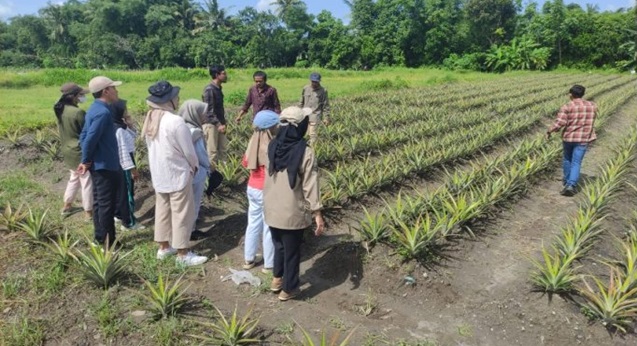The research team from Gadjah Mada University (UGM) led by Dr. Agus Kuncaka DEA, together with PT Great Giant Pineapple (GGP), monitored research on UGM immobilized humic acid and fulvic acid (AHAF) biochar, on Wednesday (22/3).
Monitoring was carried out in the soil and feed workshop of the UGM Department of Chemistry located in Pakisaji Village, Candibinangun, Pakem, Sleman. This research aims to increase soil fertility and pineapple production through the application of AHAF immobilized biochar, a product from the Ministry of Kim. Biochar is charcoal produced from the pyrolysis process of biomass, while humic acid and fulvic acid are building blocks for healthy soil.
Although both come from humus, their roles are very different. Working together, humic acid and fulvic acid provide great benefits to agriculture. Both create healthy soil rich in microbes, improve plant health, and increase crop yields. One of the greatest benefits of humic acid and fulvic acid is the increase in root mass even at low concentrations. Increasing root mass allows plants to obtain more macro and micro nutrients in the soil to be passed on to the leaves and fruit.
Pineapple planting for this research began on November 23 2023. Monitoring was carried out to observe the growth of pineapple plants and soil conditions. Agus Kuncaka explained that this research is expected to produce solutions to increase soil fertility and pineapple production. “It is hoped that this research can increase soil fertility and pineapple production. “It is also hoped that the results of this research can help pineapple farmers increase their harvests,” said Agus Kuncaka.
This research collaboration is one form of UGM’s contribution to supporting food security and the welfare of pineapple farmers in Indonesia. This research is in line with SDGs number 2, namely no hunger, and number 3, namely healthy and prosperous life. This can be seen from the solutions that are beneficial for pineapple farmers, the pineapple industry and national food security.
Thus, the visit and cooperation agenda carried out has an impact that is in line with the needs of the SDGs points. UGM is committed to continuing to carry out research and technological development to improve the quality and competitiveness of Indonesian agricultural products.

